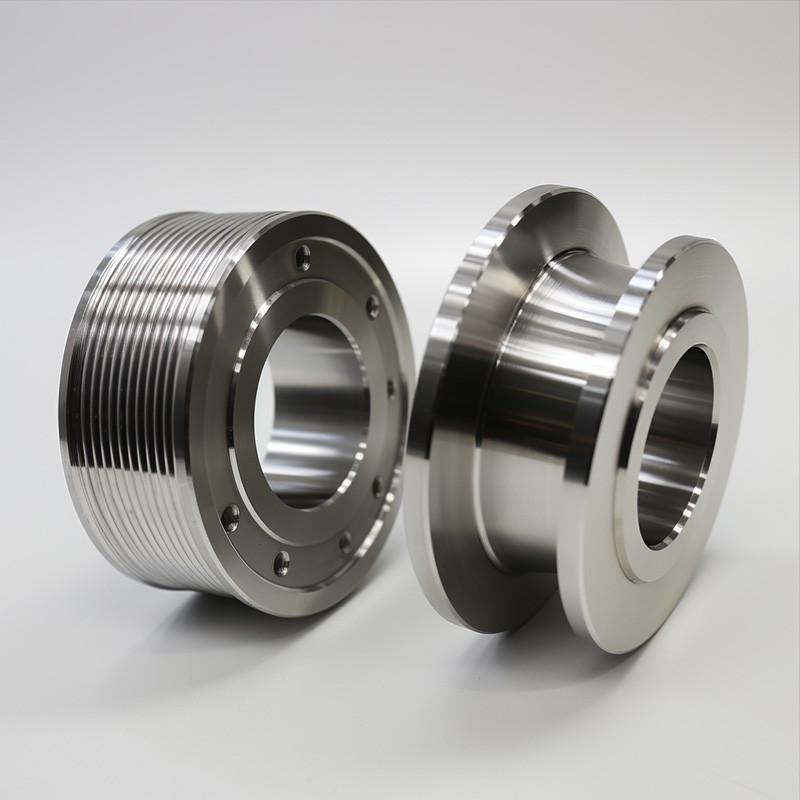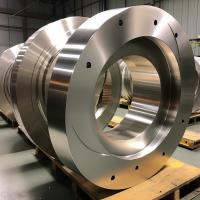CNC Machining Turning Small Spare Parts Stainless Steel Material
CNC Machining
Mini CNC Parts
While traditional machining involves a skilled machinist manually
operating a machine to remove or
shape metal based on specifications from designers and engineers,
CNC machining performs the
same metal cutting, drilling, milling, boring, grinding, and other
metal forming and removal
functions with a crucial distinction — it employs computer
numerical control rather than manual
operation.
Traditional machining relies on tools such as turn wheels, dials,
switches, chucks, vices,
and cutting tools made of materials like hardened steel, carbide, and
industrial diamond.
Measurements are taken to ensure accuracy. In contrast, CNC
machining is automated and
code-driven, developed by programmers. It delivers consistent
precision from the initial cut to
subsequent repetitions, making it suitable for digital
manufacturing and low-volume production.
CNC machining's advantage lies in its flexibility for revisions and
alterations, accommodating
modifications and different materials with ease. While traditional
machining retains its place,
CNC machining has largely taken over in manufacturing, fabrication,
and industrial production
due to its superior precision and automation.
Product Details
CNC machining encompasses a wide variety of materials, each
requiring specific machining
parameters for optimal performance. The most common materials
include:
1. Metal:
Metal is the predominant material in CNC machining, with the
ability to cut various types, from
brass to nickel superalloys like Inconel. Applications range from
injection molds to shafts and gears.
2. Plastic:
While injection molding is common for plastic parts, CNC machining
is used for specific components
like ABS, nylon, and polycarbonate. Applications include valve
bodies, bushings, and injection
molding prototypes.
3. Wood:
CNC routers are frequently employed for wood cutting, especially
for decorative purposes like
furniture, window frames, and ornamental panels.
4. Foam:
Polyurethane foam, both closed and open-cell, finds application in
CNC machining for creating
secure packaging, such as foam used in toolboxes for tool
transportation.
5. Composites:
CNC machines are essential for processing abrasive composite
materials like aramid, fiberglass,
and carbon fiber, commonly used in aerospace and marine components.
| Common Materials for CNC Machining |
| Material | Properties |
| Aluminum | 2024: Good fatigue resistance and strength; excellent toughness at
moderate to high strength levels; improved fracture toughness |
| 6061: Excellent machinability, low cost, and versatility |
| 7075: High strength, hardness, low weight, and heat tolerance |
| Brass | Versatile and highly attractive copper/zinc alloy with warm yellow
color accommodates severe forming/drawing |
| Copper | High ductility and high electrical and thermal conductivity;
develops attractive blue-green surface patina over time |
| Stainless Steel | Excellent machinability and outstanding uniformity; good
workability and weldability, high ductility and formability |
| Steel Alloy | Mix of chromium, molybdenum, and manganese yields toughness, good
torsional and fatigue strength |
| Steel Mild Low Carbon | High machinability and weldability, high stiffness; good mechanical
properties, machinability, and weldability at low cost |
| Titanium | Excellent strength to weight ratio, used in aerospace, automotive,
and medical industries |
| ABS | Excellent impact resistance, good mechanical properties,
susceptible to solvents |
| Nylon | Excellent mechanical properties, high toughness, poor moisture
resistance |
| POM | High stiffness, excellent thermal & electrical properties,
relatively brittle |



Post-processing and surface finishes for CNC machining
CNC-machined parts as they emerge from the machine often exhibit
visible tool marks, a feature
that may not align with your specific part requirements.
Fortunately, there exists a multitude of post-processing techniques
aimed at enhancing the surface
appearance and elevating attributes such as wear resistance,
corrosion resistance, and chemical
resistance.
Methods like anodizing, bead blasting, and powder coating present
viable options for refining the
final presentation of your custom parts, allowing you to achieve the
desired surface quality and
performance characteristics.
| Surface Finishing Options for CNC Machining |
| Name | Applicable Materials | Can be Applied with |
| Alodine | Aluminum | Media Blasting, Tumbling, Type II Anodizing* Type III Anodizing*,
Type III Anodizing with PTFE* |
| Anodizing | Aluminum | Media Blasting, Tumbling, Alodine* |
| Black Oxide | Steel, Stainless Steel | Media Blasting, Tumbling, Passivation |
| Electroless Nickel Plating | Aluminum, Steel, Stainless Steel | Media Blasting, Tumbling |
| Electropolishing | Steel, Stainless Steel | — |
| Hand Polishing | Acrylic | Enhanced cosmetic appearance |
| Media Blasting | Aluminum, Steel, Stainless Steel, Brass, Bronze, Copper | All post processes except Electropolish and Powdercoat |
| Nickel Plating | Aluminum, Steel, Stainless Steel | Media Blasting, Tumbling |
| Passivation | Steel, Stainless Steel | Black Oxide, Electroless Nickel Plating, Zinc Plating, Tumbling,
Media Blasting |
| Powder Coating | Aluminum, Steel, Stainless Steel | — |
| Tumbling | Aluminum, Steel, Stainless Steel, Brass, Bronze, Copper | All post processes except Electropolish and Powdercoat |
| Vapor Polishing | CNC Polycarbonate (Clear, Black) | Enhanced cosmetic appearance, near optically clear applications |
| Zinc Plating | Steel, Stainless Steel | Media Blasting, Tumbling, Passivation |
Applications of CNC Machining
Turning, a precision manufacturing technique, is adept at producing
rotational, axi-symmetric
parts featuring intricate details such as holes, grooves, threads,
tapers, and contoured surfaces.
Its proficiency shines in crafting limited-quantity items,
particularly custom-designed shafts and
fasteners utilized in prototypes. Furthermore, turning serves as a
valuable complementary process,
enabling the addition or refinement of features to parts
manufactured through alternative methods.
Notable examples of products shaped through turning include
camshafts, crankshafts, baseball bats,
bowls, cue sticks, signboards, musical instruments, and the legs of
tables and chairs.

Company Profile


FAQ's
1. Why choose CNC machining?
The choice of CNC machining is characterized by its speed,
precision, and versatility.
This manufacturing solution distinguishes itself by efficiently
producing end-use parts across
various volumes, all without the necessity for significant
investments in hard tooling or
elaborate set-ups.
2. How long does delivery time and quotation take?
The delivery time for parts is intricately tied to their
complexity. Low-complexity parts usually
have a lead time of 2-3 days, while moderate complexity extends to
2-5 days.
High-complexity parts may necessitate a lead time ranging between 5
and 15 days.
Quoting time is also linked to design complexity, ranging from 1
business day or faster for
simpler designs to 3+ business days for more intricate ones.
If you have a design that requires assessment and quoting, do not
hesitate to contact our team.
3. What are the advantages of CNC machining?
CNC machining offers a spectrum of advantages, prominently
featuring rapid prototyping and
the expedited production of full-scale parts. Its hallmark is the
ability to achieve exceptional
precision and accuracy in manufacturing, catering to tight
tolerances for CNC parts of diverse sizes.
This method stands out for its flexibility, influencing factors
such as volume, pricing, lead times,
and the array of materials and finishes available.
4. Factors Influencing CNC Machining Costs:
The cost of CNC machining a part is influenced by several key
factors, including:
1. Material: Variations in material costs arise as some materials,
such as aluminum, are more
cost-effective to machine than others like Inconel due to increased
tool wear and slower cutting speeds.
2. Complexity: Parts with intricate features incur higher machining
costs. Complex surface shapes,
for instance, are notably more expensive to machine compared to
flat surfaces.
3. Tolerances: Stringent dimensional tolerances escalate machining
costs. Specifying unnecessarily
tight tolerances on non-critical features can contribute to
increased CNC machining expenses.
4. Surface Finish: Achieving mirror finishes necessitates
specialized tooling and machining strategies,
extending machining time and subsequently increasing costs.
5. Quantity: Low-volume production inherently comes at a higher
cost per part than large-volume
production. This is because initial setup and programming costs are
distributed over a greater number
of parts in large-volume production.
















